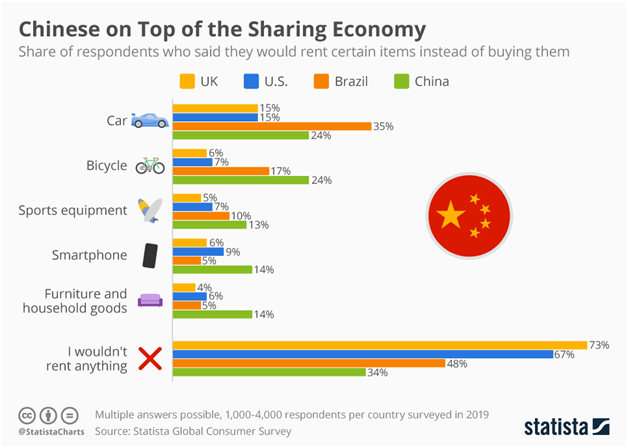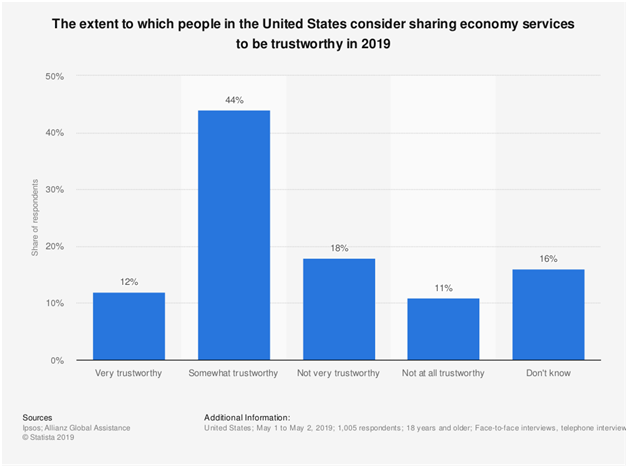Would you believe me if I said that consumers had the first taste of Collaborative Consumption in as early as 1995? When eBay was launched that year, the traditional way of how people gained access to consumer goods changed for the first time. And it sure changed for good! Since then, the continuous advancement of technologies have contributed to the rapid movement of goods and services, resulting in the tremendous growth of SharingEconomy. As a consequence, the Sharing Economy has become one of the fastest growing business trends in history, with investors dumping more than $23 billion in venture capital funding since 2010 into startups operating with a share-based model.
What is Sharing Economy
Sharing Economy, also known by various other names such as “collaborative economy,” collaborative consumption,” peer-to-peer economy,” is an economic model in which assets or services are shared directly from the stakeholders after coordination with the consumer. An economic principle that is constantly evolving, it can be simply defined as “the use of technology to support the exchanged access of goods or services between two parties or more.”

Types of Sharing Economy Solutions
Most of the collaborative consumption services fall into these main categories:
- Peer-to-Peer Lending
No Bank? You can still borrow money!
Peer-to-peer lending platforms provide options for individuals to borrow money without having to go to a bank. Based on several factors such as the borrower’s credit history, the amount required and more, the platform sets an interest rate for the amount borrowed.
Some of the major players include, LendingCLub, SoFi, CircleBack Lending etc.
- CrowdFunding
Very similar to the previous type, crowdfunding’s basic agenda is to connect people who are in need of money for a certain cause, with those who are willing to offer. A campaign is started and a target is set for fundraising amount & date, and thousands of individuals contribute to this campaign to raise the required amount. This category includes platforms such as Kickstarter, Indiegogo, FundAnything etc.
- Renting
These platforms connect homeowners with people who are looking for a place to stay when they are travelling. Prices are set on a per night basis for specific dates, allowing the visitors to browse the accommodations in respectives cities or countries.
Airbnb, Vrbo, HomeExchange, FlipKey are some of the major players in this type of shared economy.
- Ridesharing or Carsharing
Ride a car without paying for Gas or Maintenance!
This hugely popular service offers benefits of car ownership such as no dependence on public transit, not having to pay for gas or licensing & maintenance of the car. While platforms such as Uber, Quickride and Lyft offer rides to consumers, others like Car2Go, ZoomCar and ZipCar allows the customers to commandeer a vehicle and pay for the time that they are driving it for.
- CoWorking
Coworking spaces have been the recent trend in the IT industry and is the most opted solution for small businesses who are looking to cut down on extra costs. Coworking hubs allows businesses or individuals to share the cost of office rent, storage, mail and other utilities with other professionals. A weekly or a monthly fee is paid based on the space & time requirement.
- Reselling & Trading
Have you ever bought or sold anything on eBay, Craigslist or eBid ? If yes, you have been a part of this type of Sharing Economy. These platforms let you buy, sell and trade goods ( new or used ) without any face-to–face interaction with the other individual.
Effect of Sharing Economy on Industries
Sharing Economy has long been known to disrupt the traditional business verticals. With increased efficiencies and better value-to-consumer, traditional industries are being affected by the sharing economy and most of the brands will have a tough time in the near future if they do not adapt to the fast changing landscape.
- Professional Services & Personal Services
Defined by work that requires specific skill-set, knowledge & experience, the professional services space has seen the best effects of a collaborative consumption. Some of the biggest powerhouses like UpWork, Fiverr, Credo, Workhoppers provide a secure platform for businesses and individuals to hire developers, designers, or any other contractors for their work.
- Consumer Goods
The peer-to-peer marketplace adopted the concept of sharing economy as early as the 2000s, one of the oldest players being eBay. eBay offers a platform where users can buy or sell their items & have them shipped directly to their home. With factors such as affordability and convenience playing a major role in a consumer good purchasing decision, it does not come as a surprise to see that the share-based brands like eBay dominates the marketplace.
eBay also does a great job in empowering their consumers and providing them with the most convenient ways to buy goods.
- Transportation
One of the best examples of the positive impact that Collaborative consumption has had in the transportation industry is Uber. Uber and a lot of other ride sharing services provide an affordable alternative to the age-old transportation system with the help of a mobile application and a well connected network of drivers. With an efficient system in place, the shared economy does a great job in satisfying the demands of better transportation, by arguably being better than the traditional system.
Collaborative Consumption has resulted in a massive growth of Uber riders in NYC alone.
- Healthcare
This is a space where the concept of Sharing Economy has not really made its name yet. The limitations that the traditional Healthcare systems bring to the table is a major factor leading to the lack of share-based models in the industry. However, the recent years have seen few developments and startups like Cohealo are helping hospitals to be a part of collaborative consumption.
It so happens that, more than 58% of the time, medical equipments are unused resulting in increased storage expenses. Cohealo, through their share-based model, help hospitals save money by enabling them to share medical equipment with other facilities.
The Future of Collaborative Consumption
When the idea of Sharing Economy got recognized in the year 2011, it made to the list of “Ten Ideas That Will Change the World” by Time Magazine. Since then, it has definitely rattled, or even replaced some of the existing business models and has created a brand new approach towards the way people access goods and services. What is the next big movement?

You will be surprised to know that the future of sharing means, you never have to buy again! The economic model which is truly powered by people will continue to grow with more ideas and innovators finding unique ways to connect the owners and potential renters. The Collaborative culture will continue to break the ice in newer sectors to help individuals make money. Also, with the rise of various social media platforms, this will be the major driving force for the growth of the sharing economy business model in the future.
Author Bio:
Shriganesh Hegde has been the Marketing Manager at Specbee since 2016. When he is not drafting those digital strategies, you can find him creating articles for the company blog and various other global platforms. An avid reader himself, he covers the good and bad of tech in his blogs.



